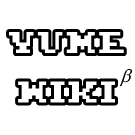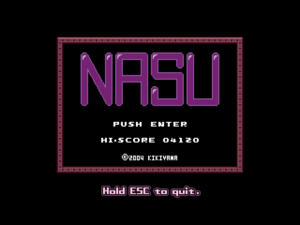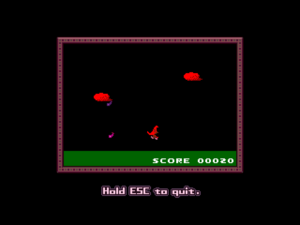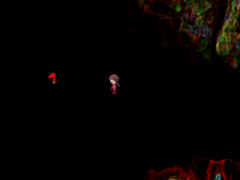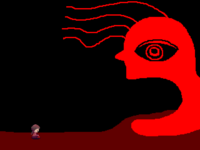(→Trivia) |
No edit summary |
||
| Line 49: | Line 49: | ||
</gallery> | </gallery> | ||
[[Category:Yume Nikki Characters]] | [[Category:Yume Nikki Characters]] | ||
[[Category:Yume Nikki Minigames]] | [[Category:Yume Nikki Minigames]] | ||
Revision as of 17:29, 12 November 2024
NASU is the Famicom game found in Madotsuki's Room. The graphics and sound highly resemble authentic Famicom/NES hardware capabilities, although the game itself is fictional.
It is named after the Japanese word for eggplant (なすび, nasubi), a type of fruit native to Asia.
Gameplay
The player plays as a red character largely resembling a bird or Tengu. They are able to walk left and right across the screen using the left arrow key and right arrow key, respectively. They can also jump by pressing the interact key, which is essential for collecting points. To exit the game, the Esc key is held.
NASU is a very simple arcade game in which the objective is to catch falling eggplants in the player character's mouth. Failing to catch a single eggplant will result in a game over. Each eggplant is worth 10 points.
For every eggplant collected, there is a 1/50 chance for a pink bonus eggplant to appear, bouncing from the left side of the screen to the right. Eating the bonus eggplant is worth 300 points, and it does not result in a game over if not eaten. It is possible to get an additional 1,000 bonus points by catching a normal and bonus eggplant at the same time.
Easter Eggs
By performing a button combination nearly identical to the Konami Code (left, left, right, right, up, down, up, down) in NASU's title screen, the player character's head is replaced with an eggplant. Doing this greatly improves the chances of a bonus eggplant appearing. While this is likely a reference to the Konami Code, it may also refer to Kid Icarus for the Famicom, where some enemies transform the player into an eggplant with legs.
Playing NASU with this trick enabled will not update your high-score after losing.
Online version
A fully playable online version made by a fan was published on Newgrounds:
Trivia
- According to unused code in version 0.09, the NASU player character was originally going to appear in the Dense Woods A and Windmill World, transporting the player to FC World C in an unused event called NASU Link.
- It is possible that NASU wasn't the only minigame intended to be included in Yume Nikki, since it is redundantly the sole member of the separate menu that appears when interacting with the Famicom. This is supported by the Thumbs.db files of version 0.04, which contains images of a scrapped game called Severed Head PK.
- There is a glitch where, if the player collects a pink bonus eggplant while a purple eggplant hits the ground, the pink eggplants will be invisible in the next NASU game that is played. Despite this, they can still be collected while invisible and all subsequent bonus eggplants collected after one invisible eggplant will be visible.
Theories
As NASU is one of the few activities Madotsuki can partake in while in the real world, it is very likely to have some effect on her dreams.
The NASU game is notable for its bright red colors. The background clouds, the player character, and the game over flash are all bright red. Such a bright color could possibly affect Madotsuki's eyes, possibly causing eye strain. This may appear in the form of the Toriningen, who have bright-pink eyes when in their lunatic form. The Number World Toriningen can also send Madotsuki to the ああああああああ event when made lunatic, which can make either a red "あ" character or a pink, bloodshot eye cover the world's floor. The Toriningen also slightly resemble the NASU player character with their long snouts and humanoid appearance. Other notable instances of bright red include Strober, Big Red, and even the droning likes of Hell and occasional bits of red interrupting the otherwise monochromatic White Desert (with characters like the Bloody Touching Monster).
The flashing red of the game over screen could also carry over into Madotsuki's dreams through the various neon-color and flashing image characters (such as the Shield-Folk, Aztec Rave Monkey and FACE) that appear. It should also be noted that one neon creature, the Neon Parrot, bears a striking resemblance to the NASU player character.
The constant looping tune that plays whenever the NASU game is played may be responsible for the short and looping tracks that play in Madotsuki's dreams, assuming that the music is meant to be diegetic (meaning that the in-game characters can hear the world's music playing).
The inclusion of a Famicom in Madotsuki's room may also reveal the time period the game takes place in: the system was Nintendo's incumbent home console from 1983 to 1990 (though it wasn't formally discontinued until 2003), making it outdated when Yume Nikki first released in 2004. This may indicate that the game takes place sometime in the then-recent past. However, it isn't unusual for someone who grew up in the 1980s to still own and enjoy using a Famicom in the 2000s, and indeed, Madotsuki's television better resembles one contemporary to 2004 than one from two decades prior. This would alternately suggest that the game is set around the time of its release, and that because Madotsuki never leaves her home, the Famicom represents when she began staying indoors.
Gallery
Madotsuki playing NASU in the manga.
